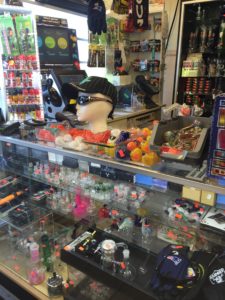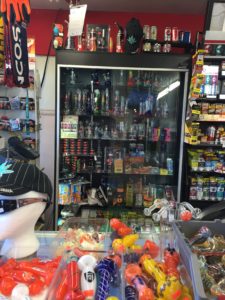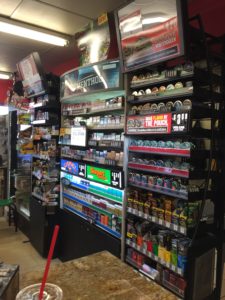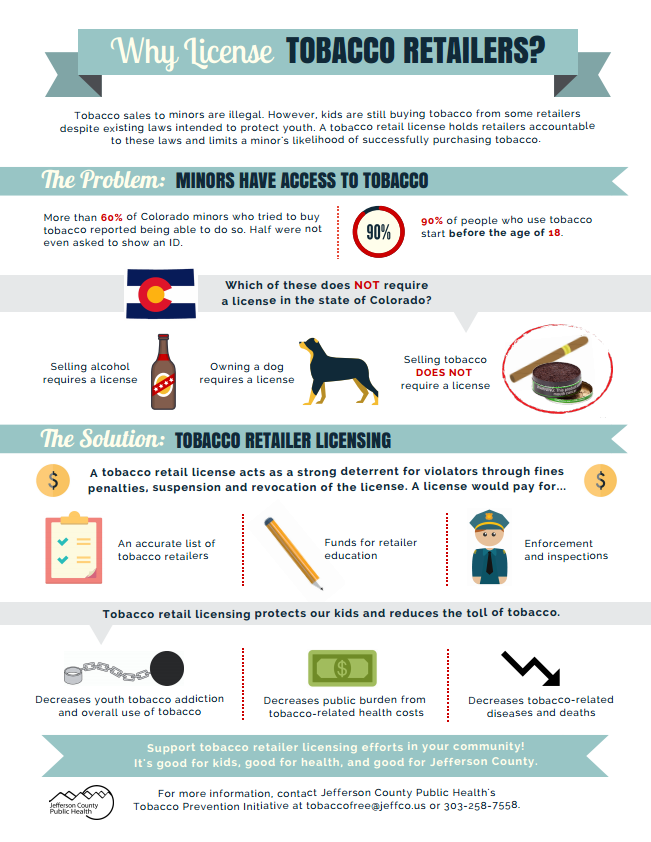Retailer Licensing in Edgewater, Colorado
In November 2016, the city of Edgewater, Colorado voted unanimously to pass a tobacco retailer licensing law. It is the 7th community to pass a licensing ordinance in the state but first the first to include licensing for cigarette sales. We talked with Tracy Doyle, Policy Specialist with the Tobacco Prevention Initiative at Jefferson County Public Health, who worked on the ordinance, to get the scoop.
What does the ordinance do?
-
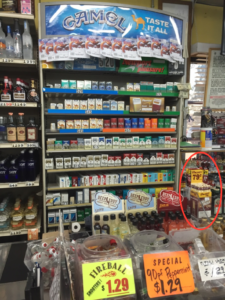
Self-service single cigars at a tobacco retailer in Edgewater Requires retailers to obtain a license to sell any tobacco products, including cigarettes and electronic smoking devices (ESDs).
- Prohibits self-service displays for any tobacco products or tobacco product paraphernalia including ESDs.
- Requires retailers that sell tobacco to require customer identification to confirm that individuals purchasing tobacco products are at least 18 years of age.
- Prohibits anyone under the age of 18 from entering a tobacco retail business without a parent or guardian and requires signage explaining this prohibition. Tobacco retail businesses are those which primarily sell tobacco products and get more than 75% of gross sales from tobacco products.
- Prohibits minors under the age of 18 from selling tobacco products, including ESDs.
- Establishes a penalty system for retailer violations (sales to minors), as follows:
- 1st offense: License suspension for 7 days or fine
- 2nd offense: 30-day suspension or fine
- 3rd offense: revocation of license or fine
- It is up to the city council to determine whether the retailer’s license will be suspended or they will be required to pay a fine. As stated in the text of the ordinance, “The fine amount shall be the equivalent of twenty percent (20%) of the licensee’s estimated gross revenues from sales of tobacco products during the period of the proposed suspension; except that the fine shall be not less than two hundred dollars nor more than five thousand dollars.”
- Read the Full Text of the bill here.
Why was Edgewater the first to include licensing for cigarette sales?
In Colorado, a previous state law (which was influenced by the tobacco industry) ruled that if a local jurisdiction passed a retail licensing law for cigarettes or a cigarette tax law, the jurisdiction would forfeit their eligibility to receive their portion of cigarette sales tax money from the state. In the case of Edgewater, a town of 5,255 people, that amount of money is estimated to be about twelve thousand dollars. However, Edgewater was willing to forgo that money in the name of public health and to include all forms of tobacco as part of the licensing requirement. Edgewater has previously been a leader in public health and pro-active on smoke-free policies. Edgewater was the first in the state to include e-cigarettes in their smoke-free public places law. The new licensing ordinance will require retailers to pay a fee of $150 to apply for or renew their license to sell tobacco, and the fees will be used to fund administration and enforcement of the law. Across the state, these fees range from $100-$150.
What was the goal?
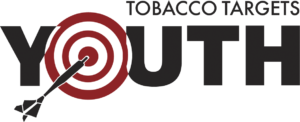
The goal was to reduce sales to minors and youth initiation of tobacco use, as well as to set a precedent for other cities across the state to follow. Tracy wanted to start in a place where she knew there was support to make sure that Edgewater passed the strongest tobacco retailer licensing ordinance they possibly could to set an example. Part of the model licensing ordinance from the state health department now includes licensing for cigarette sales as the “gold standard.” As Tracy stated in her presentation to the council, the benefits of licensing include:
- “Access – Sends a message to all tobacco retailers that a community is serious about protecting kids from illegally purchasing tobacco products.
- Accuracy – The licensing requirement can help a community to maintain a more accurate record of which local businesses are selling tobacco products, from convenience stores to gas stations to non-traditional vendors such as auto body shops and barber shops.
- Accountability – The license can fund local monitoring of tobacco sales to minors and other tobacco laws and an result in strong penalties for retailers who break these laws.
- Awareness – The license can fund local education for retailers to strengthen their awareness of how to comply with all tobacco laws.”
As you can see from the photos of the store that is closest to the local high school (approximately one half-mile), the store is full of tobacco products (including self-service displays), paraphernalia, and advertising. Two of the five stores in the city, including this one, had FDA violations within the past year.
Who was involved in passing the ordinance?
- Tracy Doyle, Policy Specialist for the Tobacco Prevention Initiative at Jefferson County Public Health (as known as JeffCo Public Health) spearheaded the effort. Tracy formerly worked in Los Angeles County as the Chief of Policy. She also worked as a coalition specialist in the Tobacco Prevention Initiative at JeffCo Public Health before transitioning to her current role.
- Two city councilmembers served as champions for the ordinance, but the ordinance was passes unanimously.
- Key partners who were enlisted to support the ordinance include:
- The Executive Director of the Edgewater Collective a local organization that focuses on supporting initiatives which produce thriving families, schools, and communities
- A community coalition called HEALthy Edgewater (Healthy Eating Active Living)
- The local BE (Breathe Easy) Team, a high school anti-tobacco youth group. A group of BE Team students spoke to the city council during the second reading of the ordinance about their work educating peers and their community about tobacco and about their support for the legislation.
- The president of the Jefferson County Board of Health, who is also a former Mayor of Edgewater
- Tobacco Free JeffCo Alliance, a county-wide coalition whose members and partners actively support local tobacco control policies.
How did they make the case?
Tracy gave a presentation to the Edgewater City Council in the spring of 2016 on the importance of policies which can help prevent youth access to tobacco. The presentation highlighted local statistics regarding:
- Rates of youth use of tobacco and e-cigarettes. For example, In 2015, in Colorado
- 2 out of 3 youth who attempted to buy cigarettes were successful
- 20% of Colorado youth have tried cigarettes, and
- 26% of high school students use e-cigarettes.
- Concerns related to youth use of e-cigarettes (including related to the use of e-cigarettes for vaping marijuana, which is now legal in state and had been seen at local schools)
- Tobacco industry targeting of youth with in-store marketing efforts and sweet, cheap products
- Sales to minor rates from Synar and FDA data
- Support for tobacco retailer licensing in JeffCo, based on a household survey
- Benefits of tobacco retail licensing – including reducing tobacco sales to minors; 4 other communities that implementing tobacco retailer licensing policies saw their sales to minors rates drop by over 76%
Tracy included photos of Edgewater tobacco retailers taken during store assessments, showcasing the wide availability of tobacco products and examples of self-service displays.
Other advocacy materials included a fact sheet on youth access to tobacco in Edgewater and an infographic (right) on tobacco retailer licensing.
To draft the ordinance, Tracy gave the city council a copy of the City of Golden’s ordinance as an example, as well as the state’s model policy. She then worked with city council members to make edits and comments on the draft. During readings at city council meetings, key partners attended and spoke in support of the ordinance.
What’s next?
The policy went into effect 30 days after it was passed, but retailers have until February 1, 2017 to obtain a license. City officials are working on developing materials to support the ordinance, including an information packet with a brochure, letter, application for a license, and a copy of the ordinance. Compliance checks will likely begin in about six months.
Originally, advocates had hoped to keep language in the bill that prohibited retailers within 500 feet of schools (as is the case in Golden, CO) as well as other youth-oriented facilities. They had also hoped to pass a Tobacco 21 policy, but the city council is waiting to see if that passes on a state-wide level. In addition, they had hoped to follow Golden’s example of license suspension as the standard penalty for violations rather than including an option of paying a fine instead of suspension. One of the benefits of licensing is that it provides a regulatory platform that can be used to enforce other tobacco marketing and sales restrictions, and these “plug-ins” may still be a goal for other localities in the state or at a later date for Edgewater.
The next step for Tracy is to work with local coalitions to educate policy makers about the issue of youth access to tobacco in other JeffCo municipalities. The Tobacco Prevention Initiative at JeffCo Public Health also recently hired a a coalition specialist who is working with the Tobacco-Free JeffCo Alliance to build coalition membership and partnerships. The Alliance has been very successful in advocating for the passage of smoke-free policies and expanding them to include vaping in the past. Now, they are re-energizing and refocusing on the issue of youth access to tobacco.
– Read more Stories from the Field –

